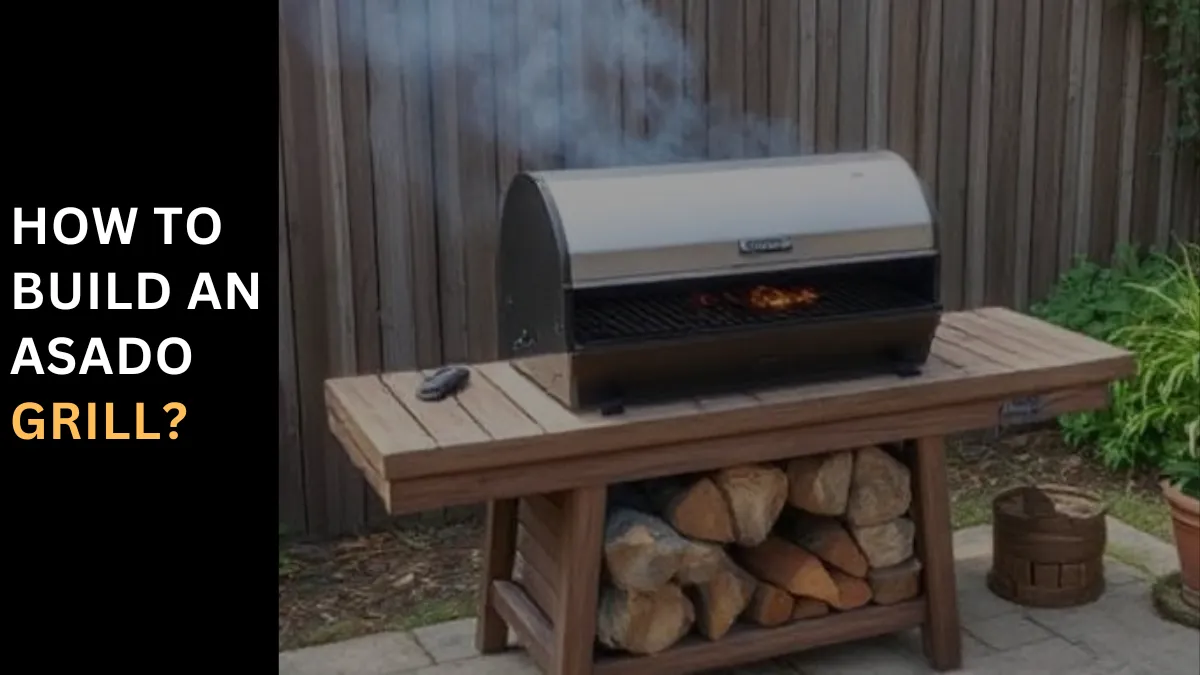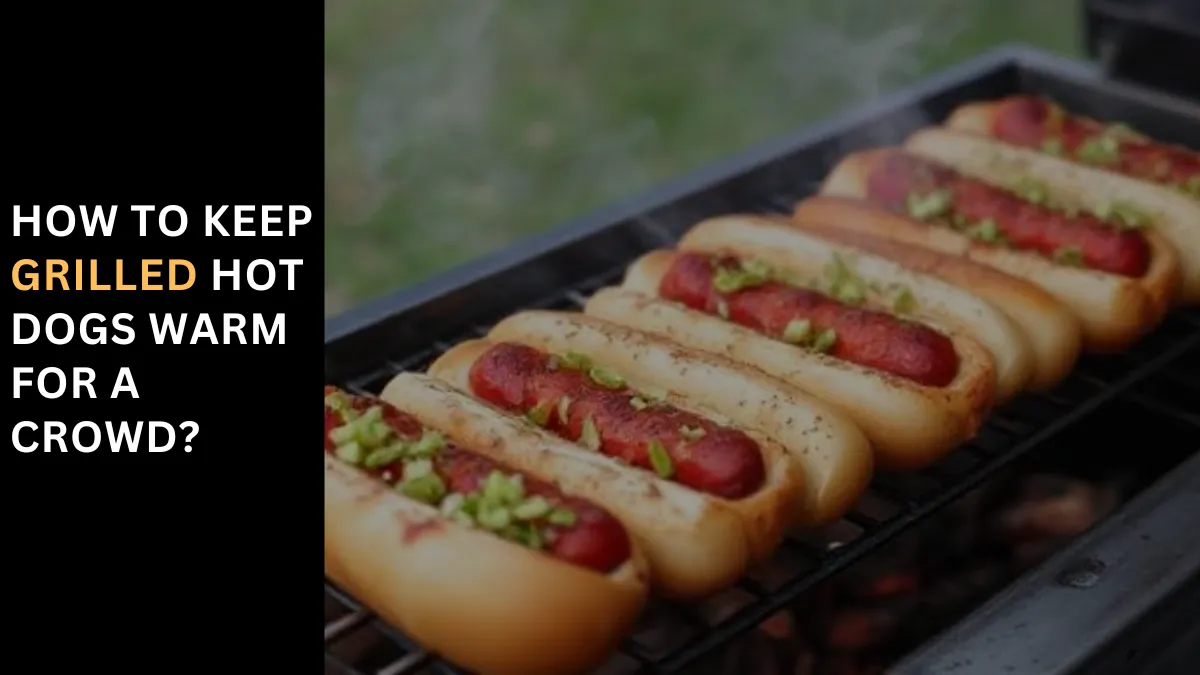Can Dogs Eat Grilled Meat?
Safety Tips, What Dogs & Cats Can Eat
When the sun is out and the weather is warm, it’s a great time to be outside and enjoy a delicious BBQ. It’s fun for everyone, including our beloved cat and dog. In my yard in Tucson, I’ve often seen pets curiously sniffing around the grill.
Many vets I’ve talked to emphasize the importance of being cautious about the BBQ foods we feed to our pets to keep them safe.
Be very careful of the foods you feed your pet
Everybody knows certain foods are safe for people but can be deadly or toxic to cats and dogs. Common BBQ items like chocolate, raisins, and grapes are known no-nos. But did you know that even dessert snacks left on tables, like hotdogs and fatty burgers, are bad?
These items are loaded with calories and are unhealthy for pets. A normal-sized dog weighs approximately 9kg (or 20 pounds), and the equivalency of them eating a couple of burgers is like a human sitting and devouring several at a time. This subject matter is close to my heart.
Furthermore, meats that contain bones, like sticks of ribs, chicken wings, or kabobs, might seem like delicious wonders for humans, but they are a choking hazard for pets. Small pieces of wood can get stuck in their throat, and pointy ends can puncture their digestive tract.
In conclusion, when you’re grilling in the sunshine, remember these tips to ensure your furry friends enjoy the day as much as you do, safely and healthily.
Following is a list of some harmful BBQ foods that you should NOT FEED your cat or dog
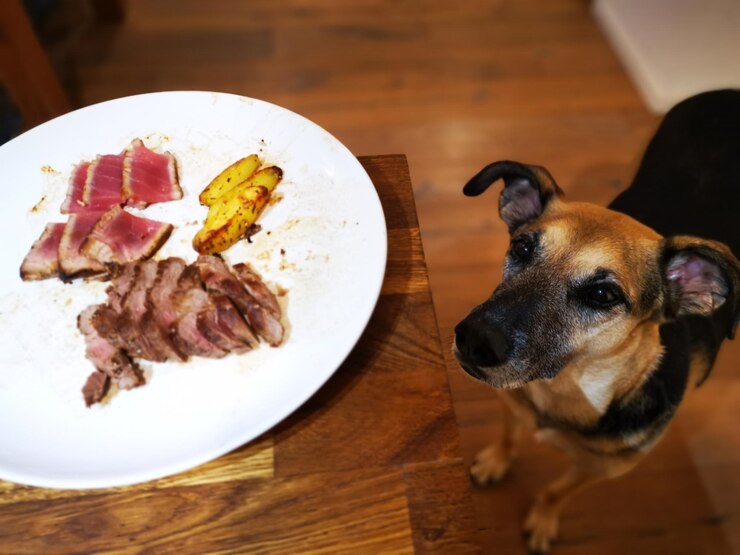
When grilling, it’s tempting to share a bite with your furry friend but beware. Some meats, uncooked or cooked, that are safe for humans can make your pet sick due to bacteria like salmonella.
Onions, shallots, scallions, and garlic are flavorful add-ons to our food, but they can destroy a pet’s red blood cells, creating a toxin buildup known as Allium toxicity.
Hotdogs, a favorite at BBQs, are laden with calories, fats, and unhealthy levels of salt and preservatives, leading to diarrhea and other digestive issues. Even a small portion can harm. Chicken Wings, often served bone-in, pose a choking hazard and can puncture the digestive tract.
Corn on the cob, due to its shape and size, can block an animal’s airway or choke them. Guacamole is another popular dip that can cause distress; its ingredients can be toxic to pets.
Chips and pretzels, those crunchy snacks we love, contain an excessive amount of sodium, leading to increased thirst, urination, and in severe cases, sodium ion poisoning with symptoms like vomiting, tremors, fever, depression, seizures, and even death.
Now let us list some of the BBQ foods YOU CAN FEED cats and dogs
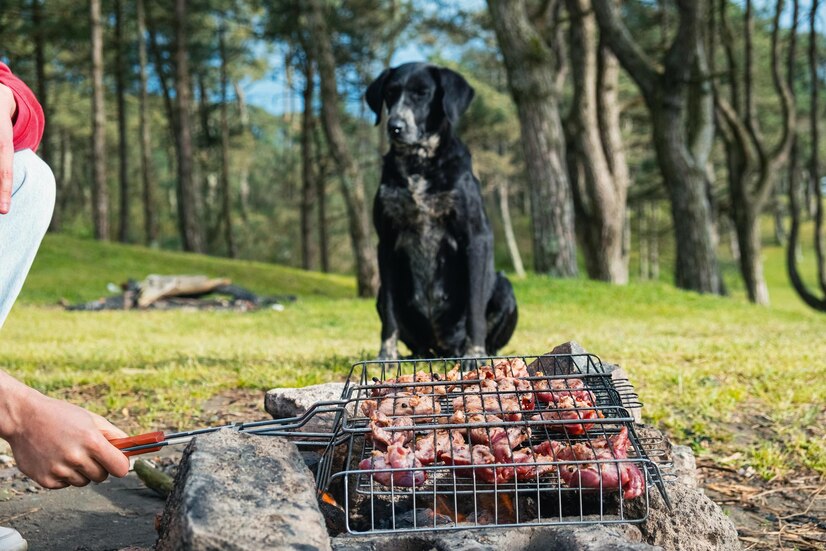
Navigating a BBQ with your pet can be tricky, but there are safe options. Lean burgers and grilled meats like steak and fish, when boneless and plain, are good choices. Ensure they’re fully cooked to avoid any health risks.
For vegetables, opt for those that are pet-friendly and cooked without spices. A hamburger, broken into a couple of small bites, can be a treat, but avoid any with seasonings or sauces. Unseasoned chicken is also safe and often appreciated by our furry friends. And for a sweet treat, a bit of Seedless watermelon can be refreshing, especially on a hot day. Remember, moderation is key to keeping your pets happy and healthy during your BBQ gatherings.
Why you should NEVER share BBQ food with cats or dogs
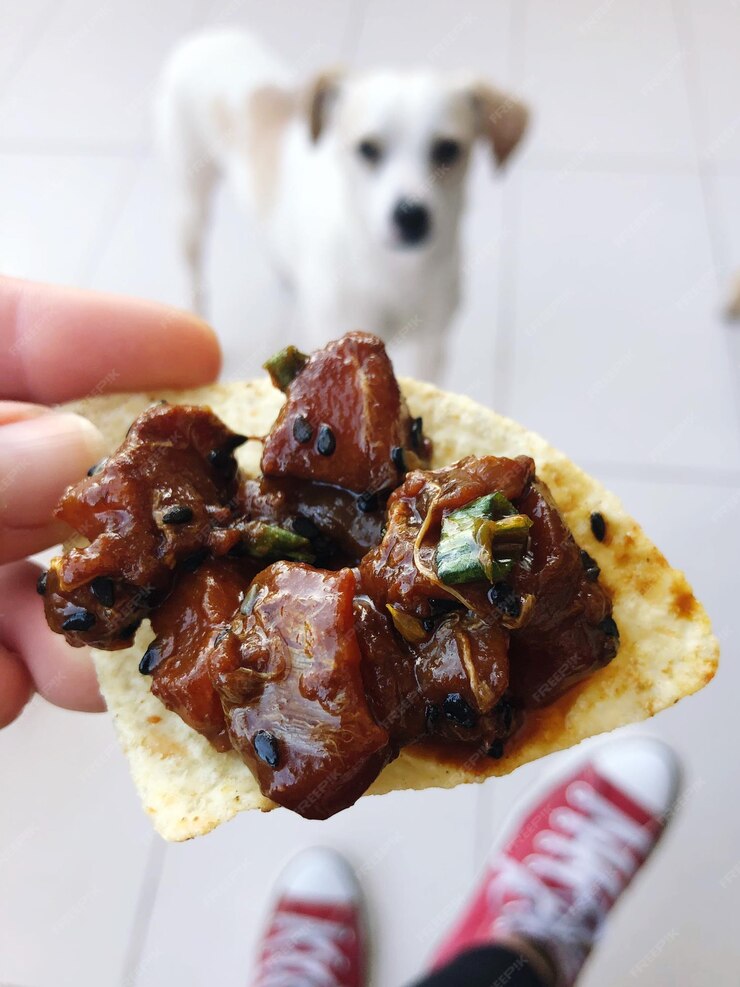
As Leticia Fidalgo Buron, a vet and technical manager at Webbox, points out, it’s essential to understand why cats and dogs should not eat BBQ food. It might be tempting to share sausages, burgers, or scraps from our barbecue, but there’s a potential for harm to our furry family members.
A casual BBQ might turn risky if we don’t leave the food unattended while enjoying the outdoors. Many items typically found at a BBQ, like corn on the cob, kebab sticks, chocolate, grapes, raisins, ribs with bones, and anything with onions, are hazardous.
However, there are some ok items if prepared carefully: cooked, deboned chicken, turkey, salmon, and certain vegetables. As for cheese, options like cheddar, gouda, or Swiss can be given in moderation. Paying particular attention to how we cook these items is key for the reasons mentioned.
1. Saltly food can leave your pets dangerously dehydrated
Salt is not only bad for humans in high quantities, but it’s also dangerous for animals. Many barbecue foods are high in salt levels, leaving pets excessively thirsty. According to Leticia, in serious cases, this can even lead to elevated temperatures and seizures.
2. Incorrectly cooked food is dangerous to pets
The risk of food poisoning from uncooked meat is a real effect to consider for your pet. When Barbecuing, it’s crucial to properly cook the food all the way through. Animals can contract nasty bacteria like raw salmonella or listeria from undercooked foods.
Leticia warns that even the least of these can cause digestive upset, diarrhea, or vomiting, and in some instances, they can lead to more serious conditions.
3. Bad bones could cause pets to choke
There’s a common misconception that it’s safe to feed dogs bones, but this can be dangerous. Leticia notes that in some cases, this can lead to severe gastrointestinal problems or even internal damage. Owners should be particularly wary of small T-Bones from steak, an issue often overlooked.
Chicken bones can get stuck in an animal’s intestines or stomach, and all kinds of bones can cause them to choke or obstruct the esophagus.
4. Letting your pets eat BBQ food could cause cancer
When it comes to BBQs, we often overlook the dangers of carbonization on the outside of burnt meat. Not only can this cause vomiting and stomach upset in pets, but experts are also citing a more alarming risk: cancer.
Leticia, a veterinary expert, emphasizes the importance of avoiding giving these charred portions to our furry companions. The compounds formed during this burning process pose significant health risks, making it crucial to keep such potentially harmful foods away from pets.
How to Keep Your Pet Safe Around the Grill?
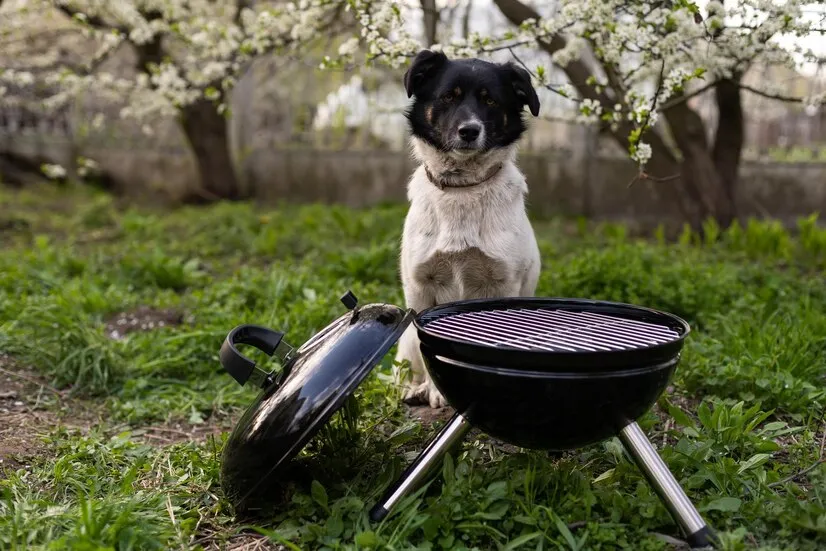
BBQs are a lot of fun for the whole family, and it’s always exciting for our pets to be outside and join in. However, there are several things to know to keep your furry companion safe during the BBQ season. Here are some ways to protect your cat or dog around the grill.
Keep them away from the grill
It might seem obvious, but with your dog running and jumping after a ball, or your cat enticed by the smells of delicious grilled chicken, there’s a risk they might try to steal a bite and end up with a burn on their paw or hurt and sick. It’s important to keep an eye on your BBQ at all times to ensure your furry friend doesn’t get too near.
Keep the grilling accessories away from your pet
When barbecuing, the supplies and equipment you use for the job – like foil, string, knives, and sprays – make up a long list of dangerous and potentially toxic items for pets.
These can get lodged in their throat, requiring surgery, or they could cut themselves on pointy objects. Keeping these tools out of reach ensures they are safely used and away from curious paws.
Make sure everything is completely clean when you are done
After enjoying a BBQ, it’s crucial to ensure everything is completely clean. The yummy meaty smell of BBQ food can linger, tempting pets to mistake leftover items like bones, plates, foils, and utensils as snacks. These can harbor bacteria if consumed, making your cat or dog sick.
Additionally, items like plastic can be a choking hazard if eaten or swallowed. To avoid such risks, all inside areas should be cleaned and kept away from the grill area. Ensure everything is fully cleaned and safely secured, especially the garbage, to prevent your animal companion from getting into it.
TOP TIP
A useful technique to stop cats and dogs from eating harmful BBQ food is to use distraction. Offering your dog or cat a special treat, like those from Webbox, can be a tasty accompaniment to your barbecues.
This method is great for distracting them from what’s happening at the grill, reducing their begging for more, and keeping them safely entertained.
What to do if pets eat BBQ food and it’s an emergency
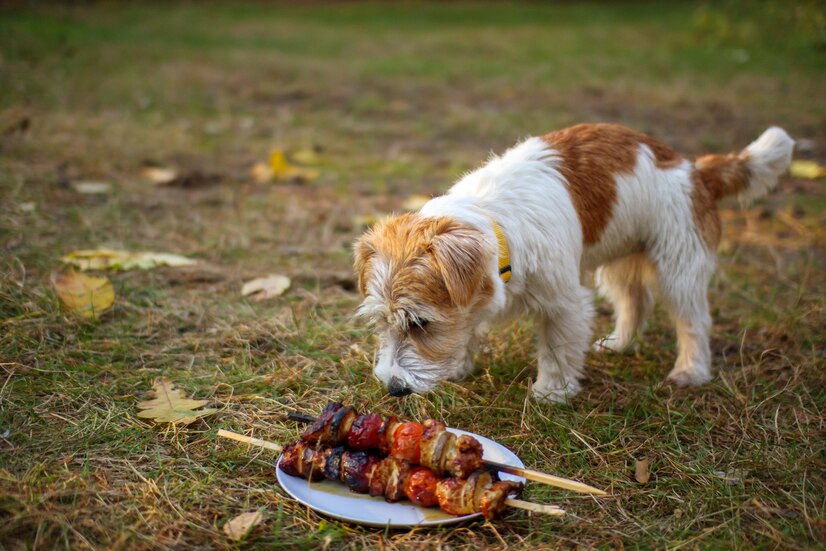
If your dog or cat inadvertently consumes BBQ food, signs for an owner to look out for include agitation, pain, sluggishness, diarrhea, vomiting, an inability to walk or perform normal behaviors, or even collapse.
Difficulty in walking, eating, or drinking are also critical indicators. As Leticia suggests, if your pet is visibly distressed, call your vet ASAP. In the meantime, get your pet away from any potential toxin they might ingest more of. Keep animals secure in a separate space and contact a pet healthcare professional for further guidance.
Conclusion:
In conclusion, while dogs can safely enjoy small amounts of grilled meat as an occasional treat, it’s crucial to exercise caution and moderation. Grilled meat can provide some nutritional benefits, but it should never replace their balanced and specially formulated dog food.
Additionally, it’s essential to ensure the meat is plain, unseasoned, and cooked thoroughly to avoid any potential harm to your furry friend. Always consult with your veterinarian for personalized dietary advice to keep your dog healthy and happy.
Remember that the key to a dog’s well-being lies in a balanced diet tailored to their specific nutritional needs. While grilled meat can be a tasty and enjoyable addition to their diet, it should be a rare indulgence rather than a staple, and it’s essential to prioritize their overall nutrition and health.
People also ask
Can dogs eat grilled beef?
From personal experience, I’ve found that dogs can indeed enjoy cooked steak as an occasional treat. However, it’s crucial to avoid feeding them raw meat. Grilled meats, when prepared correctly, are not only high in protein but also beneficial due to their vitamins and nutrients. This makes them a suitable addition to your pet’s diet in moderation.
What is the Best Meat for Dogs to Eat on the Grill?
When it comes to grilling for your canine companion, the options are plentiful. Meat, including beef, chicken, and even fish like salmon, can be a delightful share with your dog, provided it’s fully cooked and completely bone-free. It’s essential to serve these meats unseasoned to ensure your pet’s safety and health.
Can a Dog Eat Grilled Chicken?
Grilled meat, INCLUDING CHICKEN, can be a tasty treat for your dog. However, when preparing hamburger patties or chicken, it’s vital to remember that these should be cooked plain, without any seasonings, spices, garlic, or onions, which are NOT suitable for your pup. These ingredients can be harmful, so always make sure the meat is plain to suit your dog’s taste and health needs.
Is charcoal-grilled meat bad for dogs?
When it comes to charcoal-grilled meat, pet owners should be aware that while it isn’t poisonous, it can upset a dog’s stomach if they eat it.
This type of meat commonly causes vomiting, diarrhea, and loss of appetite in dogs. Additionally, large pieces can lead to obstruction or pose a choking risk.
Can dogs eat BBQ sauce?
BBQ sauce, whether referred to as barbecue or barbeque sauce, is not safe for dogs. These sauces often contain high amounts of salt and sugar, and their ingredients can contribute to kidney failure. Many dishes also include garlic and onions, which are known to be toxic to our furry friends.
Can dogs eat barbecue ribs?
As for whether it’s safe for dogs to consume ribbons, caution is advised. Despite nothing being unsafe about the act of gnawing on a bone, the shape and size of rib bones, often found in table scraps, make them a choking hazard. The risk increases if a dog attempts to swallow these bones.
Can dogs eat BBQ food?
When it comes to letting your pooch indulge in BBQ delights, caution is key. It’s essential to make sure they don’t eat anything seasoned or marinated. The sauce and seasonings used in BBQ often contain high levels of sugar, salt, and fat, which can lead to health issues like dehydration, high blood pressure, and pancreatitis in dogs.
Drawing from my own experience with pets, I’ve learned that while dogs may show a keen interest in BBQ foods, their well-being must be monitored, and restrict their access to such items.



